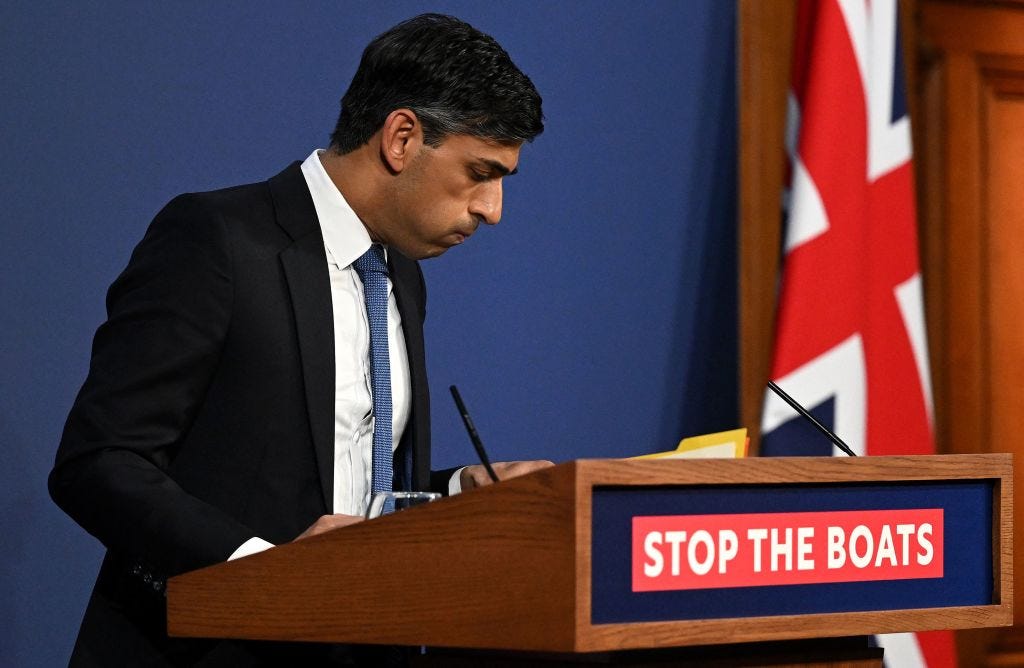Collision Course
How the Illegal Migration Bill Undermines Sunak’s Election Strategy
At times it seems like we have two Prime Ministers. We have the Rishi Sunak who does friendly joint appearances with Ursula von der Leyden, Emmanuel Macron, and Joe Biden, cutting deals, and looking statesmanlike. That Prime Minister calmed the markets after the Truss fiasco; has backed a welcome, if tough to implement, expansion of childcare; and has dealt well with the reappearance of the Boris Johnson clown car. This Rishi Sunak resembles a normal Prime Minister who is at least attempting to do the job properly.
Then there’s the other Rishi Sunak. This one made Suella Braverman home secretary and had her launch a travesty of an immigration bill that in effect opts Britain out of the UN Refugee Convention. He appointed Lee Anderson, a campaigner against foodbanks and for capital punishment, his Deputy party chair; put forward nonsense legislation on public sector strikes for a few headlines; and spent a large chunk of his leadership stump speech last summer doing a culture war act.
This is, of course, a deliberate twin-track strategy rather than a personality disorder. Indeed the immigration and culture war announcements are explicitly known as Track B within No 10. It is reflected by a bifurcation of responsibilities in Downing Street. Eleanor Shawcross, head of the policy unit, is covering things like the childcare announcement. Will Tanner, Sunak’s deputy chief of staff and protégé of Theresa May’s adviser Nick Timothy, is leading on immigration, and the current plan looks remarkably like Timothy’s proposals set out in a report for the CPS think-tank.
To close observers of politics this looks extremely cynical. But of course most voters are not close observers of politics and some kind of dual strategy is probably necessary to hold together the Tories’ 2019 voter coalition. Boris Johnson was able to focus his election campaign on socially conversative Leavers knowing that more liberal Tory and centrist types wouldn’t be able to stomach Jeremy Corbyn, and were desperate to get Brexit over with. With Starmer a far less scary prospect they need to combat Labour on seriousness and competence – or a least a facsimile of it, and this is Sunak’s comfort zone. They also, though, need to continue to appeal to those 2019 Tory voters who are economically well to the left of Sunak and Hunt, but do worry about high levels of immigration and the wider rise of social liberalism.
It's probably the best strategy available. Or at least the best one that a politician of limited range like Sunak is likely to employ. It’s highly unlikely to win then a fifth term but it could – as per my “2010 scenario” limit the damage, and perhaps force Labour into running a weak minority government. Poll averages suggest Labour have maintained a solid 15-20pt lead but it’s dropping slightly, and Sunak’s personal ratings are going back up again. There’s still 18 months to go to the election so you can see why Tories are exhibiting a guarded confidence absent since Truss crashed and burned.
There are a number of threats to this strategy but most are, to some degree, at the mercy of external factors. The economy could fail to recover, or, at any rate, enough for voters to notice any difference. We could face another NHS winter crisis even worse than the last one. But there is one threat – the Illegal Migration Bill – that is entirely self-inflicted and, given Sunak is generally fairly cautious, hard to explain. To understand why it’s such a risk we need to take a closer look at the Bill, its flaws, and how they could derail the PM’s strategy.
Keep reading with a 7-day free trial
Subscribe to Comment is Freed to keep reading this post and get 7 days of free access to the full post archives.


